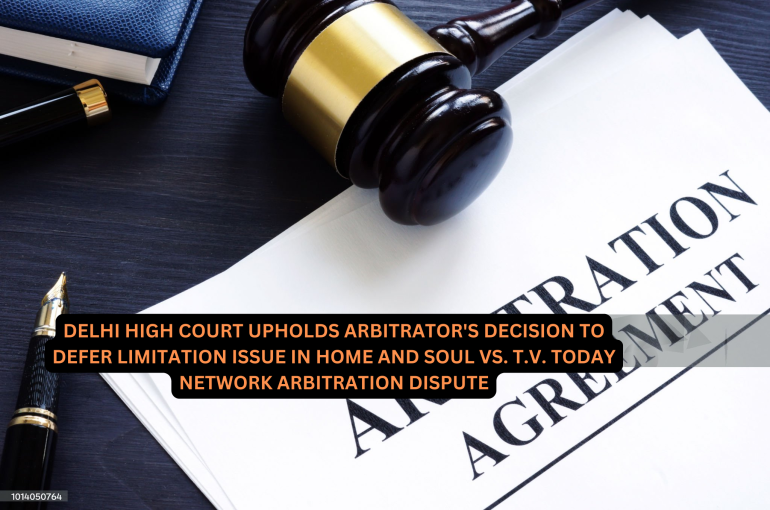DELHI HIGH COURT UPHOLDS ARBITRATOR’S DECISION TO DEFER LIMITATION ISSUE IN HOME AND SOUL VS. T.V. TODAY NETWORK ARBITRATION DISPUTE
Introduction
The case between Home and Soul Private Limited and T.V. Today Network Limited [W.P.(C) 14422/2024, CM APPL. 60450/2024 & CM APPL. 60451/2024] was recently decided before the High Court of Delhi, focusing on whether the ongoing arbitration proceedings should have addressed the “limitation” issue—a question of whether the Petitioner’s claim was time-barred—right at the beginning. This summary breaks down the key facts, legal issues, arguments from both sides, and the Court’s final judgment in simple language.
Facts of the Case
The Petitioner, Home and Soul Private Limited (formerly Vertical Limits Infratech Pvt. Ltd.), and the Respondent, T.V. Today Network Limited (formerly Mail Today Newspapers Pvt. Ltd.), entered into what’s called a “Barter Agreement” (Agreement).
Under this Agreement, the Petitioner provided advertising space to the Respondent, expecting either a property transfer or a cash payment in exchange. The official period of the Barter Agreement ended in 2014. However, the Companies continued interacting up until 2016, with the Respondent still receiving advertising services.
In 2021, the Respondent informed the Petitioner that it would no longer fulfil its obligations under the Agreement, creating the basis of the dispute.
To resolve the dispute, the parties moved to arbitration, where the Respondent raised a preliminary objection, arguing that the Petitioner’s claims were time-barred under the law of limitation (meaning too much time had passed since the dispute began for it to be legally actionable).
Earlier in 2024, the High Court had ordered the Arbitrator to address this limitation issue first. However, the Arbitrator deferred the issue, deciding to address it only after examining all the evidence.
The Petitioner argued that the limitation issue is fundamental and should be settled right away because it could dismiss the claim outright, stopping the proceedings.
The Court needed to decide whether it should intervene immediately to ensure that the Arbitrator follows its earlier instructions to decide on limitation as a preliminary matter.
Petitioner’s Arguments
The Petitioner argued that since the limitation issue might eliminate the Arbitrator’s jurisdiction to even hear the case, it should be decided as a preliminary question. In a prior decision, the High Court had directed the Arbitrator to settle the limitation issue first. By postponing this, the Petitioner claimed that the Arbitrator was disregarding the Court’s clear instructions.
According to the Petitioner, since the limitation issue was clearly based on existing documents, there was no need for extensive evidence, and the Arbitrator’s decision to defer it was causing delays. They argued that the Court should step in to enforce its earlier order and resolve this matter before any further arbitration proceedings.
Respondent’s Arguments
The Respondent contended that determining whether the claim was time-barred required a factual investigation, including reviewing the specifics of the parties’ business dealings. They argued that this was not simply a “legal” question that could be answered without evidence.
The Respondent emphasized that the Arbitrator has the authority to decide the order in which issues are addressed. They argued that deferring the limitation issue was well within the Arbitrator’s rights, particularly given the factual background.
Pointing to the Arbitration and Conciliation Act, the Respondent maintained that the purpose of arbitration is quick dispute resolution without constant Court involvement. Judicial interference at an early stage, they argued, goes against the principle of allowing Arbitrators to manage the proceedings.
Analysis by the Court
According to the Court, under the Arbitration and Conciliation Act 2016, the Arbitrator has the right to decide on jurisdictional issues, including limitation, at any appropriate stage. Section 16 of the Act empowers the Arbitrator to handle such jurisdictional challenges and decide whether to address them immediately or defer them.
The Court referenced previous cases to explain that judicial interference in arbitration is only permitted in rare and exceptional circumstances. Intervening at every step, particularly for preliminary issues, disrupts arbitration’s intended efficiency.
The Court pointed out that arbitration was created to reduce time and costs by allowing proceedings to move forward without continuous Court involvement.
The Court explained that limitation questions often depend on both legal and factual assessments. Here, for example, whether the claim was time-barred could hinge on when the dispute effectively arose and the nature of the interactions between the parties from 2014 to 2016.
The Court stated that the Arbitrator’s decision to defer the limitation issue until the evidence was reviewed was appropriate given the complex factual background.
The Court concluded that the Arbitrator’s decision to defer the limitation ruling was legally sound. Since the Petitioner could still challenge the limitation issue as part of the final award, immediate judicial intervention was unnecessary.
Judgement
The High Court dismissed the Petitioner’s plea for intervention and refused to instruct the Arbitrator to decide on the limitation issue upfront.
The Court advised the parties to allow the arbitration to proceed, reiterating that they could raise concerns over the limitation issue and other matters once the Arbitrator delivers the final award. This judgment reinforces the Arbitrator’s role in managing procedural aspects of the case, supporting the legal framework that encourages limited judicial involvement during ongoing arbitration.
Key Takeaways from the Judgment:
-
- The Arbitrator’s choice to delay the limitation issue was within legal bounds and did not violate any principles of arbitration law or the Court’s earlier directions.
- The Petitioner has the right to raise the limitation question after the arbitration concludes, as part of any challenges to the final award.
- By deferring intervention, the Court upheld the purpose of arbitration as a quick and effective dispute resolution method, free from frequent judicial interruptions.
ASHITA
ASSOCIATE
THE INDIAN LAWYER & ALLIED SERVICES.





































Leave a Reply